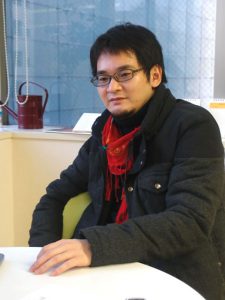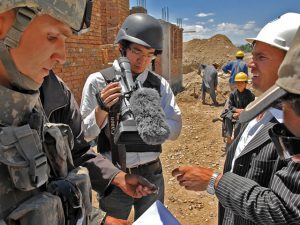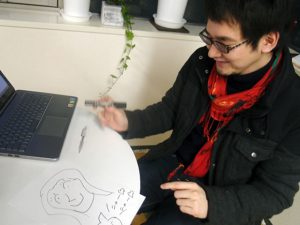[Original by Yuka WATANABE, 2015 Public Relations Intern (May 9, 2016); Translated by K. Adachi/R. Florea/A. Senkoff]
Hello, my name is Yuka Watanabe. I am a PR intern in 2015 for JVC. The 17th interview is with Mr. Tohru Shirakawa, who is in charge of the Minamisoma project. He used to be a journalist who dealt with areas of conflict before joining the staff of JVC. He is well experienced, having covered a story in Afghanistan when he was only 21 years old. I am interested in learning why Mr. Shirakawa, who has extraordinary career, became a staff member of an NGO and why he became in charge of the project in the city of Minamisoma in Fukushima prefecture. I am going to explore his background.
I heard you used to be a journalist. It is an unusual occupation but why did you think about becoming a journalist?
I had a dream to become a journalist since I was a junior high school student. It was the time when the Iraq and the Afghanistan war had just happened. There were journalists who had seen the war with their own eyes and reported facts that were not publicized by mainstream media. This is what inspired me to become that kind of journalist. At first I wanted to join a newspaper company, but I found that it was only possible to be a correspondent after working 30 years. And it was not certain if I could be a correspondent of a country where I wanted to go. Therefore I decided to do it by myself and became a freelance journalist. I abandoned classes at a university in Australia and came back to Japan in order to start the activity. I was 21 years old at that time. I asked the representative of Asia Press International, a group of freelance journalists, and learned basic journalism skills.
It is unique (laugh). What activity did you do after that?
I went to Afghanistan for the first time in December 2006. Kabul was a very cold place and temperature sometimes reached -20°C. People were dying every day due to coldness and hunger, when I visited a refugee camp to cover a story. I strongly felt that I had to report the reality. If there are people dying in front of you and nobody reports on it, it is the same as if it did not happen. I hated such an idea so I was desperate to report it.
I made calls to about 100 media after came back to Japan. At that time the issues in Afghanistan were of low news value. In most cases, my calls were immediately hung up. I continued to contact media and did not give up. Then the stories concerning issues in Afghanistan started to be published in “AERA”, “DAYS JAPAN” or “Weekly Friday.” Although I was a young journalist in the twenties, I gradually got work from newspaper and magazine companies.
I think that going to dangerous zones is the job of journalists in a way, do you have a sense of fear?
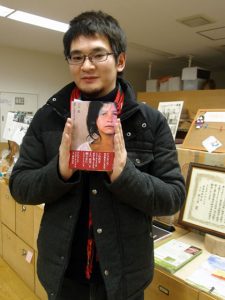
The book written by Mr. Shirakawa, “Sorrowful & beautiful people in Afghanistan”. Anger, despair, fear and hope are recorded with about 60 pictures.
Of course it is a hesitation that I have and I am scared naturally. I don’t want to go to the battlefield. But if I don’t do it, who else reports the fact? I have to do it if nobody does it. I was going to cover a story under such determination. I believe everyone has their own mission and reporting and becoming a journalist is mine. My enemy is the ignorance and indifference of people. I have continued to work as a journalist in order to fight against this and report stories.
Why did you become a staff of JVC?
I was getting tired gradually as I continued the activities that involve being a journalist. It was a difficult job in terms of the money and physical strength required and I was tired of the difficulty in trying to make an impression on people around the world. I thought it was necessary to take a break and I decided to stop for one year. Then I applied to the position of intern at JVC. JVC was carrying out project in Afghanistan, which I previously interviewed. Due to this coincidence, I was hired as an intern of the Afghanistan project for one year. Just a month before the beginning of my internship, however, the Great East Japan Earthquake occurred. In order to cover a story about the region affected by the disaster, I headed to Minamisoma city in Fukushima prefecture and I went in front of the nuclear plant. I was stunned by the significant impact of the damages. The support was not being delivered enough and policemen wearing protection suits were searching for dead bodies in areas damaged by the Tsunami. Cows and horses had become very skinny and there were even dead dogs scattered around the area. The damages were much worse that I had expected. I was not able to cover the story since I was not able to clear my thoughts.
Covering a story is pretty hard for both of interviewers and interviewees. I pointed my camera to capture any person that was deeply hurt in Afghanistan. That is because I felt strong sympathy for them and wanted to “report” as same human beings. However, I don’t know why but I couldn’t do the same for the people in Minamisoma. That is why I stopped covering the story and returned to Tokyo. While I was still feeling very confused, my internship at JVC began.
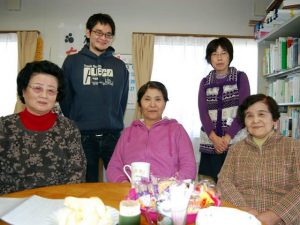
Together with all who work for the Minamisoma project. He says that the object he is involved in has changed to Minamisoma, but there is no change in his mission.
When a couple of weeks passed since I had started, Mr. Hasebe, the secretary general of JVC, asked me. “Are you interested in a part-time job?” I accepted his offer and helped with that work. Soon I found that I became the staff member in charge of the project in Minamisoma, which JVC had newly started. That is to say, I became a staff member of JVC by accident, while I was worrying a lot (laugh).
I feel the strong fate. How do you feel after you became the staff?
To be honest it was hard to make financial settlements or reports because it was my first time doing those things, but I slowly began to feel that I was a good match for what I was doing. I had been a journalist till that time but I feel that the relationship of the jobs of journalists and NGO staff is similar to two wheels of a car, although their jobs are different of course. It was common that both of them are motivated to work “to make the world better even a little”. NGO was the place where I could undertake actions by myself and send messages in order to fight the ignorance and indifference of people, which is an enemy to me.
At present moment, I am in charge of the management of a salon, where people living in temporary houses can gather, as a part of the Minamisoma project. If we did not conduct this activity, there might have been people dying alone in temporary housing because they had no place to go. The fact that “I can change something” is motivating me. The impact of our activity may be small, yet this change wouldn’t have be made if I hadn’t helped.
[My impression after the interview]
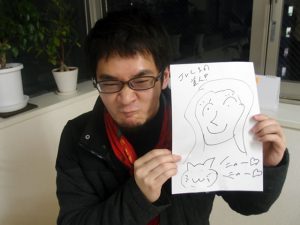
A funny facial expression of Mr. Shirakawa, who rarely points to a camera, although he has taken many pictures.
Mr. Shirakawa, who has two faces as a journalist and NGO staff, has a lot of points of views. I was fascinated by him passionately speaking about the fact he has seen by himself. I found out a lot of new information by hearing stories from various perspectives. I saw some real strength in him as he tries to face his personal mission even if it is scary.
[Notice for next interview]
I am going to interview who is said “most beautiful woman in JVC” according to Mr. Shirakawa.
Share This:
